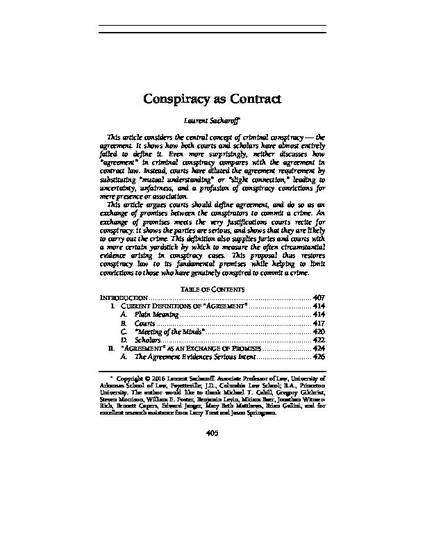
Article
Conspiracy as Contract
U.C. Davis Law Review
(2016)
Abstract
This article considers the central concept of criminal conspiracy — the agreement. It shows how both courts and scholars have almost entirely failed to define it. Even more surprisingly, neither discusses how “agreement” in criminal conspiracy compares with the agreement in contract law. Instead, courts have diluted the agreement requirement by substituting “mutual understanding” or “slight connection,” leading to uncertainty, unfairness, and a profusion of conspiracy convictions for mere presence or association.
This article argues courts should define agreement, and do so as an exchange of promises between the conspirators to commit a crime. An exchange of promises meets the very justifications courts recite for conspiracy: it shows the parties are serious, and shows that they are likely to carry out the crime. This definition also supplies juries and courts with a more certain yardstick by which to measure the often circumstantial evidence arising in conspiracy cases. This proposal thus restores conspiracy law to its fundamental premises while helping to limit convictions to those who have genuinely conspired to commit a crime.
Keywords
- conspiracy,
- criminal conspiracy,
- free speech,
- First Amendment,
- antitrust,
- criminal law,
- agreement
Disciplines
Publication Date
2016
Citation Information
Laurent Sacharoff. "Conspiracy as Contract" U.C. Davis Law Review (2016) Available at: http://works.bepress.com/laurent-sacharoff/8/
